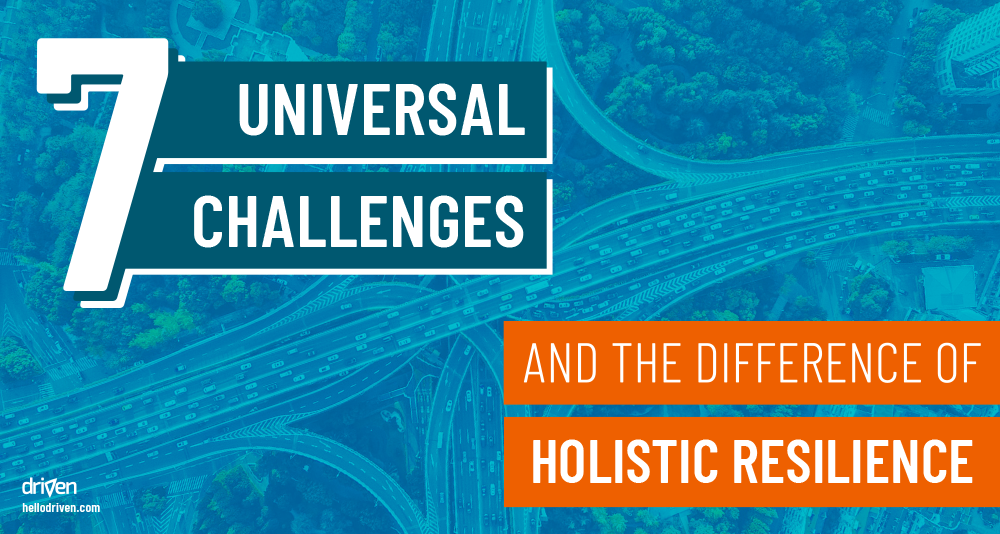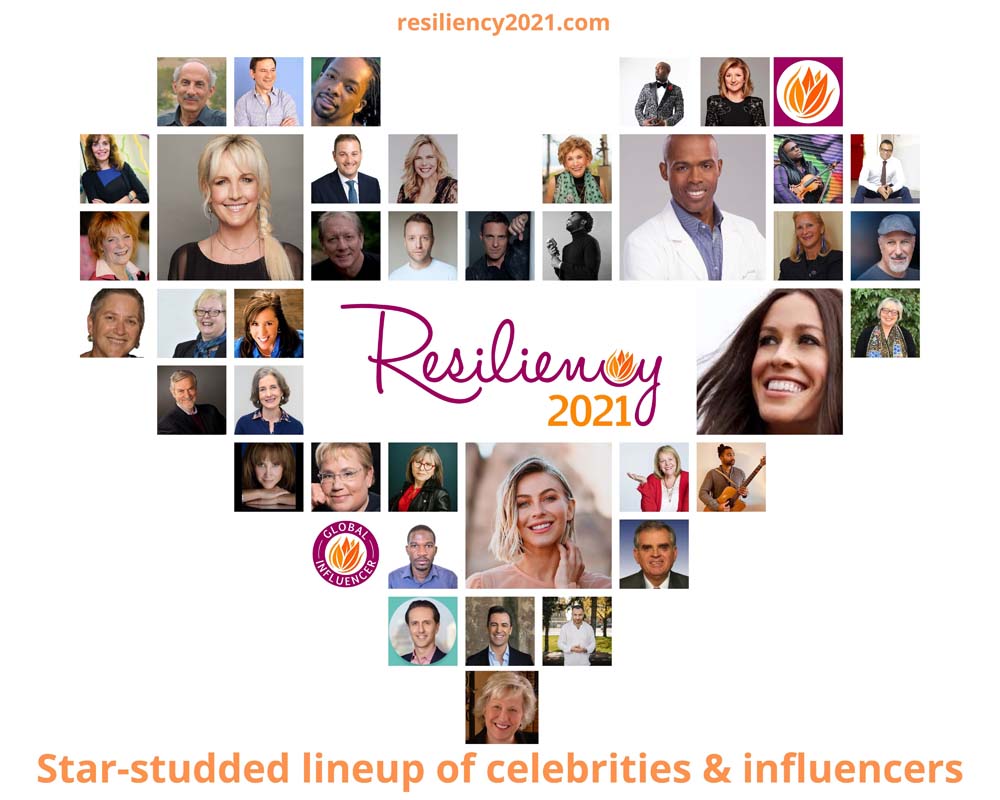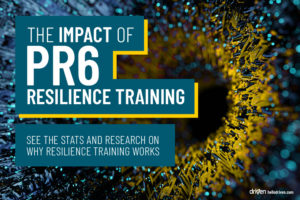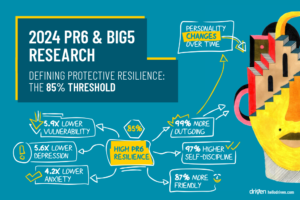In evolutionary terms, resilience has always been important for the survival of species. However – for humans – resilience is less about physical factors and more about higher cognitive functions, such as working towards a sense of purpose, problem solving, maintaining emotional composure, and more. As the main bipedal species, this means resilience is not something we’re born with, but instead is something we need to actively curate within ourselves – especially when you consider all six domains of resilience.
To a great extent, resilience has always been important, but there are also some growing trends that I’d argue are making resilience even more important now than ever before. To understand this, it’s useful to put these emerging factors into context with the enduring factors. Let’s take a look.
Enduring factors – Why resilience has always been important
Success doesn’t come easy. This simple fact was true thousands of years ago, and it’s still true now. At the heart of success is persistence – in particular, the ability to be persistent when everything seems to work against you. As even Einstein said: “It’s not that I’m so smart; It’s because I stay with problems longer.” Whether you seek success as an executive, or as a carpenter, or as a parent – success takes consistent time and effort. Resilience generates the capacity to stick to it and keep going, even when we face big hurdles along the way. It’s not just about bouncing back, it’s about coming back even stronger than before, always advancing towards your goals.
Global instability and uncertainty. We often like to think that the current government or politicians are the worst ever, but it’s probably fair to say that every generation has their ups and downs in terms of politics. This, combined with international tensions and a seemingly endless array of wars, contributes to a sense of uncertainty about the future. Without resilience, it’s easy to get weighed down by a sense of hopelessness about the situation. However, through our own vision, persistence, and ability to come up with new solutions, we can keep fighting for a better future and push our governments towards an enlightened future – this is what resilience enables us to do.
Life comes knocking. Adversity and tragedies are a natural part of life. We will all face these eventually, whether as a major illness, personal tragedy, or death of a family member. As devastating as these events can be, it’s useful to remember that billions of people before you have faced these types of adversity, and the vast majority moved on eventually. The difference resilience makes is in your preparation for these events. Do you simply survive the event, or do you come back with a renewed sense of purpose to make the most of every moment of life? Proactively developing resilience before an event prepares you for the eventual knocks of life. Rather than getting knocked down, you will grow from these events to become a beacon of support for others.
Emerging factors – Why resilience is becoming even more important
Accelerating change. Technology increases the speed of change in life and business. As businesses access more information at a faster pace, so too do change cycles come around faster and faster. New technology in our personal lives also means keeping up with developments, regardless of our stage in life. Phrases like “I don’t do computers” don’t really work anymore. When these changes come around, they create a sense of incongruence in us. To continue learning about these new developments, we need resilience to stick with it past the initial frustrations (a good test of this is to ask someone to learn Snapchat!). Gone are the days of studying something once and then being set for the next few decades. Now, we must embrace continual learning and ongoing advancement of ourselves, our fields of expertise, and constant change in the world around us.
Misinformation overload. Interestingly, as information has become more accessible, so too has misinformation. It seems the internet is quite adept at amplifying our own biases, feeding us exactly the information we need to cement our preferred ways of thinking. Just as business practices, political campaigning and advertising techniques become more sophisticated, we must also become more discerning in what we allow into our brains. Certainly, not all information is equal, and we must learn to recognise what is valid and what isn’t. In our resilience model, the Reasoning domain focuses on the active pursuit of increasing critical thinking and problem solving skills. This includes building your ability to challenge your own beliefs, assumptions and the knowledge you gain.
Robot workers. Automation is certainly one of the most interesting challenges we face as humans. As machine learning and specific artificial intelligence tools improve, we are able to automate more and more of the sophisticated tasks that once only humans could perform. This means career paths that were previously stable are now being disrupted as robotics and software enter the market. This doesn’t always mean we’re out of the job. Instead, it often means we need to quickly learn new skills to supervise the robotics tools. However, as these tools become more sophisticated, it does mean more workers will be displaced. Those with high levels of resilience, who can stay clear-headed enough to quickly accept new opportunities, will be the ones who continue to advance in an automated world.
Innovate or die. Businesses now frequently face disruption from unexpected competitors. For example, banks don’t fear what other existing banks will do – instead, they are worried about the entrance of a nimble startup with a novel product that can outmanoeuvre their clunky product development cycles. More than ever, we need resilience to provide us with the mental latitude to generate disruptive ideas (even if the solution means making ourselves redundant!) and then fight through the bureaucracy to bring the idea to life. Quite simply, if we don’t bring these ideas to life, someone else will.
To some extent these emerging factors are also historic phenomena – though what sets them apart today is the speed at which they are manifesting. There are so many advancements and breakthroughs taking place right now, and many are invisible to the average person. Think about it – knowledge has become so advanced and so specialised that you need to be deeply involved in that specific field to be aware of the progress.
Of course, just because we don’t see these advancements, doesn’t mean they aren’t starting to affect our lives. Before we know it, some totally unexpected new technology is changing the way we live and operate. Sometimes it’s obvious and we all know about it, like self-driving cars. Other times it’s behind the scenes and invisible, like robotic workers automating transactional back-office work.
What’s important is having the resilience to deal with the impacts these changes bring. But more importantly, being proactive in our approach so we see the writing on the wall and can act ahead of time. Resilience is not just about bouncing back – it’s about being proactive to continually advance. It is this ability that will become increasingly important as we face new challenges in a digital world. With that in mind, it’s up to us to consciously work on developing our own resilience to meet these challenges head-on.
What do you think – do you agree that resilience is becoming more important?
If yes, check out the upcoming Resiliency Forum 2021. With a focus on personal empowerment and promoting strategies to enhance resiliency, the Resiliency Forum brings together inspirational speakers, empowering clinicians, talented artists, life-changing authors, and noted professionals, all dedicated to enhancing our ability to bounce-back and thrive.
Some key speakers this year include Arianna Huffington, Edith Eger Ph.D., Alanis Morissette, and myself.
All the best,
Jurie




